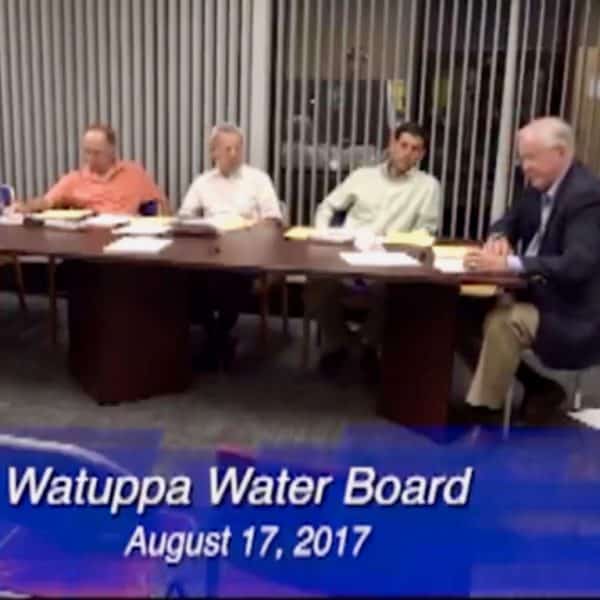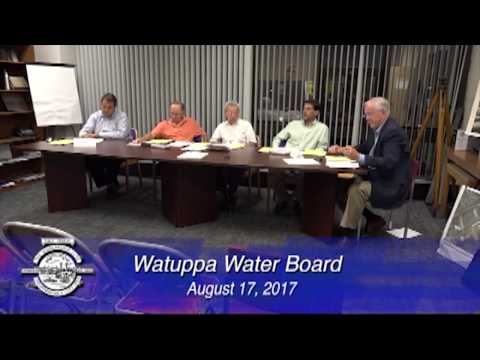Fall River identified as Invenergy’s backup water source
The City of Fall River, Massachusetts has entered into an agreement with Invenergy to supply water to cool the turbines of its proposed $1 billion fracked gas and diesel oil burning power plant. When Invenergy released its supplemental Water Supply Plan on September 28, they announced the deal made with the Narragansett Indian Tribe but redacted details of a second
October 21, 2017, 3:47 pm
By Steve Ahlquist
When Invenergy released its supplemental Water Supply Plan on September 28, they announced the deal made with the Narragansett Indian Tribe but redacted details of a second water supply. That second water supply is the Watuppa Water Board, which manages the water for Fall River.
A copy of the deal, signed by Fall River Mayor Jasiel Correira II and Jeffrey Benn of Benn Water and Heavy Transport Corporation outlines the agreed upon terms of the deal. A video of the August 17 Watuppa Water Board meeting, where board members approved the deal on a 2-1 vote, can be seen here:
“The Project is a major energy facility and Benn has entered into a contract to provide water supply thereto known as the Clear River Energy Center located in Burrillville,” says the agreement.
In the agreement Benn estimates that they would need approximately 18,720 gallons per day (GPD) in the Summer, requiring three trucks per day. However, continues the agreement, “Benn may require up to 40,000 GPD which may necessitate up to five truck deliveries per day” and, “Upon the occurrence of certain events at the Project, Benn may require up to 88,000 GPD, which in turn may necessitate up to eleven truck deliveries per day.”
Fall River will bill Benn Water on a scale: $0.012 per gallon for the first 500,000 gallons per calendar year, $0.010 per gallon for 501,000 to 1,000,000 gallons and $0.008 per gallon for all water over 1,000,000 gallons.
The price is about $72 for a 6000 gallon truck.
“All trucks,” says the agreement, “to be billed at full capacity.”
In addition, Benn Water will pay Fall River $25,000 per year, starting on March 1, 2018 for the privilege of buying the water. Even if Fall River supplies no water to Benn Water, the company must pay the annual fee. While Benn Water may terminate the agreement for any reason, Fall River can only terminate the contract for cause.
Benn water trucks would fill their tanks at the Water Department Facility at 1620 Bedford Street, Fall River, MA, or at “a designated hydrant of point of delivery, which shall be equipped with a backflow preventer.”
 |
| Invenergy’s redacted Water Supply Plan |
The original agenda for the August 17 Watuppa Water Board meeting had no notice about the deal with Benn Water. The revised agenda merely added the words, “Contingent Water Supply” with no additional details. At the meeting, as can be seen in the video, details are kept to a minimum and the discussion is somewhat circumspect. There is no mention of Invenergy, or a power plant, only of Benn Water. The Town of Burrillville is mentioned once (at the 1m35s mark), mistakenly referred to as a possible “primary source of water.”
In the video, boardmember Christopher Ferreira notes that bulk water rates in Fall River are significantly higher than in surrounding communities. Benn Water, it turns out, will be charged twice the rate for water that residents would pay.
This information spurred boardmember Robert Pearson to ask, “With everything that’s been said, especially about the rates, why does Benn Water want to do business with us? Why not go to Newport or somewhere else?”
“We’re the only community, nearby, that’s large enough to be able to provide the service they want, the quantity that they want,” replied John Friar II, Watuppa Water Board clerk.
“This is a corporation that’s going to pay twice as much as other companies are paying in other areas,” said Pearson later in the meeting, “and yet they still want to come here and buy the water. I can’t find that feasible as a business person.”
“Well, there’s a little backstory that I’d rather not get into here,” replied Friar. “But, it makes sense, in light of circumstances.”
In the end Pearson voted against the proposal, Ferreira and Board Chair Norman Valiquiette in favor of the proposal.







